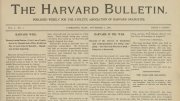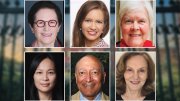The HAA Clubs and SIGs [Shared Interest Groups] Committee Awards honor individuals who provide exemplary service to a Harvard club or Shared Interest Group (SIG), and recognize those clubs and SIGs that have organized exceptional programming. Awards were presented to the following recipients at the HAA Board of Directors’ winter meeting on January 31.
Judith B. Esterquest ’72, Ph.D. ’80, of Manhasset, New York. Esterquest has held various roles in the Harvard Club of Long Island since 1996. As president, she revised bylaws to clarify the club’s mission and expand membership to parents. In 2005 she created the Harvard Club of Long Island Distinguished Teacher Award Program, which offers local teachers the chance to attend classes at the University, and has otherwise honored more than 100 educators from more than 65 schools in the community.
John J. West Jr., M.B.A. ’95, of Cambridge. West is the HAA director for Professional Interest Shared Interest Groups (SIGs) and the immediate past president of Harvard Alumni Entrepreneurs (HAE). At HAE, he spearheaded a five-year strategic plan to expand and sustain the SIG. As HAA director, he has played a crucial role in helping struggling SIGs grow stronger by sharing advice and business experience, troubleshooting, and providing critical resources to ensure they thrived.
Membership in the Harvard Club of Poland has risen from 20 to 300 alumni within the past six years due to popular club events that feature top business and political leaders, as well as lectures by Harvard faculty. In 2011, the club also drew a crowd by hosting the annual HAA European Club Leaders’ Meeting, with guest speaker Lech Walesa. In addition, club leaders have strengthened connections with both current Harvard undergraduates (e.g., by hosting a spring dinner) and potential Harvard candidates. Its “Path to Harvard” essay competition elicits more than 1,000 applicants annually, from which two undergraduate and two graduate candidates are chosen to meet with Harvard admissions officers and Polish students in Cambridge.
In a successful bid to reinvigorate the Harvard Club of Sacramento, newly elected board members have built “a highly engaged membership” on multiple fronts: more than 250 alumni and guests have participated in club events within the past year. Using its new “AlumniMagnet” website, the club creates two monthly e-newsletters that reach 800 alumni. Through a simple but effective motto—Do “just one thing” for the club—members have creatively expanded personalized events ranging from bird-watching and potluck dinners to olive-oil tastings and an “underground tour” of Old Sacramento.
By forming an alliance between the schools, the MIT-Harvard Club of Colombia has broadened its membership base and increased its activities. The organization has also been instrumental in integrating Latin American Harvard clubs as a whole. In 2011, it hosted the first regional HAA Latin American Club Leaders’ Meeting in Cartagena, Colombia, which brought together nearly 20 leaders from the 12 clubs. The club also fosters undergraduate connections, in part through events that bring together local high-school students and Harvard College students doing summer internships in Colombia.








